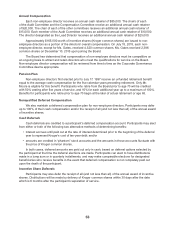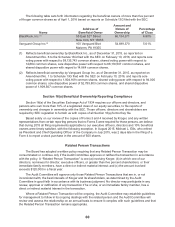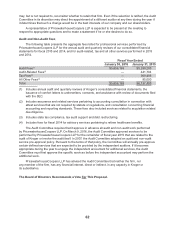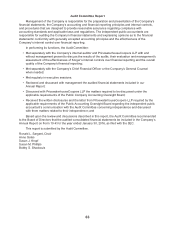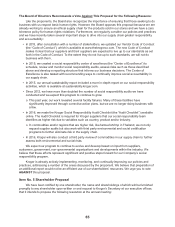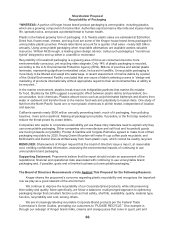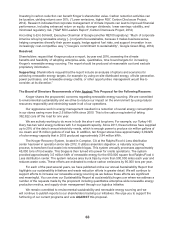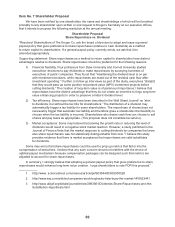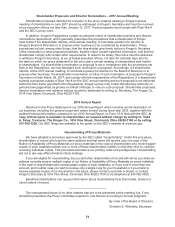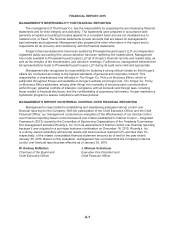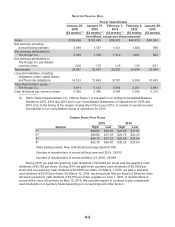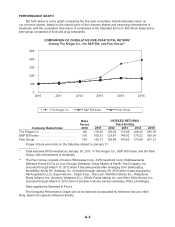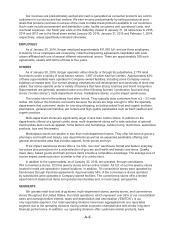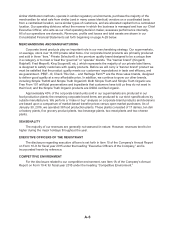Kroger 2015 Annual Report Download - page 70
Download and view the complete annual report
Please find page 70 of the 2015 Kroger annual report below. You can navigate through the pages in the report by either clicking on the pages listed below, or by using the keyword search tool below to find specific information within the annual report.
68
Investing in carbon reduction can benefit Kroger’s shareholder value. Carbon reduction activities can
be
lucrative, yielding returns over 30%. (“Lower emissions, higher ROI”, Carbon Disclosure Project,
2014).
Research indicates that corporate management of climate impacts can lead to improved financial
performance, including enhanced return on equity, stronger dividends, lower earnings volatility, and
minimized regulatory risk. (“S&P 500 Leaders Report”, Carbon Disclosure Project, 2014)
According to Eric Schmidt, Executive Chairman of Google (another RE100 signatory): “Much of corporate
America is buying renewable energy [...] not just to be sustainable, because it makes business sense,
helping companies diversify their power supply, hedge against fuel risks, and support innovation in an
increasingly cost-competitive way
.”
(“Google’s commitment to sustainability”, Google Green Blog, 2014).
Resolved:
Shareholders request that Kroger produce a report, by year end 2016, assessing the climate
benefits and
feasibility of adopting enterprise-wide, quantitative, time bound targets for increasing
Kroger’s
renewable energy sourcing. The report should be produced at reasonable cost and exclude
proprietary
information.
Supporting: Shareholders request that the report include an analysis of options and scenarios for
achieving renewable energy targets, for example by using on-site distributed energy, off-site generation,
power purchases, and renewable energy credits, or other opportunities management would like to
consider, at its discretion.”
The Board of Directors Recommends a Vote Against This Proposal for the Following Reasons:
Kroger shares the proponents’ concerns regarding renewable energy sourcing. We are committed
to environmental sustainability and we strive to reduce our impact on the environment by using natural
resources responsibly and minimizing waste in all of our operations.
Our aggressive work in energy management resulted in a reduction of overall energy consumption
in our stores saving more than 2.5 billion kWh since 2000. This is the carbon equivalent of taking
362,922 cars off the road for one year.
We are actively working to do more in both the short- and long-term. For example, our Turkey Hill
Dairy has two wind energy turbines with 3.2 megawatt capacity. Since 2011, these turbines have supplied
up to 25% of the dairy’s annual electricity needs, which is enough power to produce six million gallons of
ice cream and 15 million gallons of iced tea. In addition, ten Kroger stores have approximately 3,092kW
of solar energy capacity that in 2015 produced approximately 3.94 million kWh.
The Kroger Recovery System, located in Compton, CA at the Ralphs/Food 4 Less distribution
center has been in operation since late 2012. It utilizes anaerobic digestion, a naturally occurring
process, to transform food waste into renewable biogas. This system annually processes approximately
45,000 tons of food waste. This biogas is then turned into power for onsite operations. The system
provided approximately 3.5 million kWh of renewable energy for the 650,000 square foot Ralphs/Food 4
Less distribution center. The system reduces area truck trips by more than 500,000 miles each year and
reduces waste costs. These efforts are estimated to reduce carbon emissions by 90,000 tons per year.
For each of the past several years, we have published online our annual Sustainability Report that
highlights our sustainability initiatives and waste reduction efforts in greater detail. We will continue to
support efforts to increase our renewable energy sourcing as we believe these efforts are significant
and meaningful. You can view our Sustainability Report at sustainability.kroger.com where we address a
number of the requests made by the proponent including quantitative enterprise-wide renewable energy
production metrics, and supply-chain management through our logistics initiative.
We remain committed to environmental sustainability and renewable energy sourcing and we
will continue to publish reports to our shareholders tracking our initiatives. We urge you to support the
furthering of our current programs and vote AGAINST this proposal.


